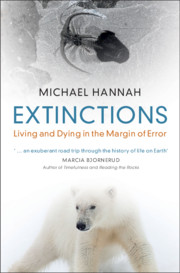Book contents
- Extinctions
- Reviews
- Extinctions
- Copyright page
- Epigraph
- Dedication
- Contents
- Preface
- Acknowledgements
- Further Reading
- Introduction
- 1 The Anthropocene and the Earth System
- 2 A Short Detour: The Fossil Record and the Geological Time Scale
- 3 The Origin of Animals and the Emergence of the Earth System
- 4 Documenting Ancient Biodiversity
- 5 Mass Extinctions: The Basics
- 6 Causes of the End-Permian and End-Cretaceous Extinction Events
- 7 Time Heals All: Recovering from a Mass Extinction
- 8 The Late Quaternary Megafaunal Extinctions
- 9 Surviving the Anthropocene
- Book part
- Further Reading
- Index
Introduction
Published online by Cambridge University Press: 01 September 2021
- Extinctions
- Reviews
- Extinctions
- Copyright page
- Epigraph
- Dedication
- Contents
- Preface
- Acknowledgements
- Further Reading
- Introduction
- 1 The Anthropocene and the Earth System
- 2 A Short Detour: The Fossil Record and the Geological Time Scale
- 3 The Origin of Animals and the Emergence of the Earth System
- 4 Documenting Ancient Biodiversity
- 5 Mass Extinctions: The Basics
- 6 Causes of the End-Permian and End-Cretaceous Extinction Events
- 7 Time Heals All: Recovering from a Mass Extinction
- 8 The Late Quaternary Megafaunal Extinctions
- 9 Surviving the Anthropocene
- Book part
- Further Reading
- Index
Summary
We are probably living in the newest period of geological time, the Anthropocene. This interval of time is in the process of being formally established by the geological community to reflect the extraordinary impact that humans have had on the planet. Future geologists will examine rocks of Anthropocene age and, preserved in them, will recognise the massive changes to the planet’s ecosystem brought about by human activity. They will find the remains of huge mega-cities and the debris of manufacturing. The sediments will clearly show immense changes in land use, with forests and grasslands abruptly giving way to the intensive agriculture needed to feed an exploding population. Their sophisticated geochemical analyses will show how the planet underwent rapid warming, the result of humans injecting excess carbon dioxide into the atmosphere. Future palaeontologists will note a significant shift in the fossil record. In older sediments deposited prior to the Anthropocene, they will recover fossils reflecting a diverse mammal fauna. But that will change as we enter the Anthropocene. Here, the rocks will yield a mammal fauna much less diverse than the one that preceded it. Not only that, but the fauna will be dominated by fossils of domesticated stock – sheep, pigs, and cattle. And this loss of diversity won’t be confined to mammals. The record will show a massive loss of biodiversity across all biotic groups in response to deteriorating environmental conditions.
- Type
- Chapter
- Information
- ExtinctionsLiving and Dying in the Margin of Error, pp. 1 - 10Publisher: Cambridge University PressPrint publication year: 2021

